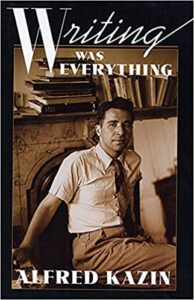Writing Was Everything by Alfred Kazin 1994
Kazin was nearly 80 when he gave the Massey Lectures at Harvard in 1994. The Massey Lectures were initiated in 1984 with a donation from the coal magnate William E. Massey and before Kazin’s lectures, speakers included Toni Morrison, Irving Howe, and Gore Vidal. Of interest is that the last Massey Lectures were given in 2017. Despite living in Cambridge since 2004, I’ve managed to miss all of them.
Kazin, the child of Jewish immigrants, was an independent literary and cultural critic whose work was honored by receiving the first Truman Capote Lifetime Achievement Award for Literary Criticism in 1996, an award that has only been given once since then (George Steiner was the recipient.). Kazin’s contributions included 18 books and a number of anthologies which he edited.
This book was weakened by originally being lectures and lacks a strong central theme and structure. Each of the three lectures were oriented around WWII, being placed before, during, and after the war. The chapters read like extended schmoozing sessions about friends and acquaintances in the New York literary world over a period of 60 years—from his earliest years writing book reviews for the New Republic to his arrival at Harvard as an 80 year old looking back over a long and successful career. We meet his editors and professors, Edmund Wilson, Malcolm Cowley and Mark Van Doren as well as the writers he admired like Dreiser, Shaw, and Woolf as well as those he deplored like T.S. Eliot with his socially acceptable anti-semitism. Along the way, Kazin drops jewels of insight such as “The centrality of some great and usually dire action that decides the future—Eve succumbing to the serpent, Cain killing Abel, Oedipus not knowing that it is his father he kills and his mother he marries—-is the truth at the heart of literature.”
Cheever’s short stories, Orwell’s essays, the novels of Kafka, Camus, Gide, Sartre, Bellow and Flannery O’Connor all come in for praise. In praise of Camus’ The Stranger, Kazin writes that it “is a protest against the socialized obligation to close our eyes to the abyss where we really live, where we conceal our dread and rarely recognize how little we know.” Such were the works spawned by the disaster that world war produced.
This is not a great book, but it provides a fascinating entry into the mind and thinking of one of the 20th C’s great critics. If time and mind permit, I’d like to read his memoir, ‘New York Jew’. Until then, I’ll follow up with Cheever’s and O’Connor’s collected stories.



